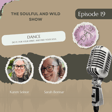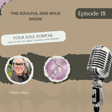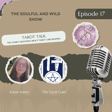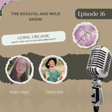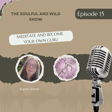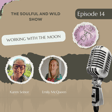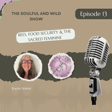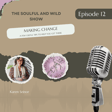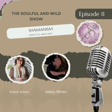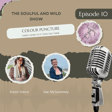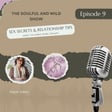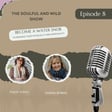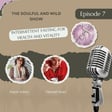Introduction to End Stage Matters and Death as a Rite of Passage
00:00:15
Speaker
Good morning to you both. Now I've got Rose Sexton and Nicole Parker here from End Stage Matters and they are both end of life doulas and we're going to talk about death as a rite of passage today. Rose is also a palliative care nurse with years of experience and Nick is a very good counsellor and she's also of course a death doula.
00:00:46
Speaker
So, how on earth did you get into this role?
Nicole's Journey to Becoming a Death Doula
00:00:52
Speaker
Now, I mean, it makes sense, I guess, counseling, part of care nursing, but end of life doula. What does that actually mean? And, you know, what does the concept of death as a rite of passage mean to you? I mean, there's huge questions here. So take it away.
00:01:14
Speaker
You go first, Nick. I was going to say, good morning. Good morning, good morning. Well, I think my journey towards an end of life dueler was the death of my brother. And it happened a long time ago, but when I was in looking for what to do next in 2018, I went to a
00:01:42
Speaker
workshop on starting a small business and I had one idea and then there was an a birth doula there and I went oh that's really interesting and I went home and researched and I found death doula and then I thought ah this is what I want this is it this is how I want to be so then um the following the following weekend was the workshop on
00:02:07
Speaker
End of Life Dula, the first foundational workshop. So I went from my training in vanilla for opening my business to Melbourne to the workshop. So it was very synchronistic. And then the following weekend was the four day workshop. So I went again from vanilla from the business to the four day workshop in Melbourne.
Rose's Professional Journey and Inspirations
00:02:33
Speaker
So from then on, I was sort of pretty hooked.
00:02:37
Speaker
and wanting to do it. But it's taken a long time to get going. And I've tried all sorts of things. But I think Rose and I met up in 2018 as well, or 2019, I think. 2018 or 2019, I connect. One of my strengths is a networker. So I was connecting all the dualers to see if we could work together. So Rose and I hit it off. And then we went on our adventure.
00:03:06
Speaker
doing a lot of death literacy via a play, via Rose and her partner had, what was it called, Rose? The night, the death trivia nights. And we've dressed up as all sorts of different things we've done, dying to know day, death cafes, a whole lot of different things. So we've kind of done that right across the Northeast.
00:03:35
Speaker
And so now I'm doing regular death cafes. But I'll let Rose describe a bit more about how she got into it and also about what our role is because it's quite diverse in our roles.
00:03:51
Speaker
Yeah, beautiful. So for me, I think I've had a lifelong interest or a career long interest in palliative care. When I look back in my 40 plus years of nursing, I've always been drawn to this kind of space, got into oncology nursing fairly early and did some study, did little courses and things around palliative care, even like way back in the 80s.
00:04:21
Speaker
And I did some study then in palliative care in 2008, 9, 10.
00:04:35
Speaker
And then I met Bill in 2015 and he was a yoga teacher and he was helping people. He was helping this one particular man who was facing end of life and he was just sort of saying, oh, I wish these people had somebody to navigate.
00:04:55
Speaker
through the whole sort of mess of end of life. He said that he and his wife are just sort of swimming in this, bobbing about in the ocean and not really knowing what to do and what kind of supports are out there. And so through that conversation we just sort of
Western Culture's Denial of Death
00:05:11
Speaker
don't know. I don't know exactly how we stumbled on it, but I stumbled on a web search and found this role of a death dueler. And I thought, wow, that sounds exactly what I'd love to do.
00:05:25
Speaker
So we researched it. I did some study with a woman in the States and then I went to Hawaii and did a week long course in Hawaii as well. So there's people around the world who are obviously teaching it and the UK and the US are much more further ahead than Australia in terms of having death doulas sort of embedded into the health landscape.
00:05:54
Speaker
Yeah. And of course, for my experience, it was like, yeah, I want to be a digital or know all about death. And then people started dying. Thanks very much.
00:06:09
Speaker
So my best friend died in 2017 and we started looking at this in 2015, started exploring things and then she was unwell and she died in 2017. And then fairly soon after that, or even as that was happening Bill, my mate was diagnosed with
00:06:35
Speaker
secondary melanoma and so that was a two and a half year journey and it was it was amazing to go through that with him who was you know sort of totally wide-eyed and happy to
00:06:52
Speaker
to grapple with the whole thing. It wasn't sort of someone who's saying, I don't want to talk about it. So it was an incredible experience and certainly taught me a lot. So he died in June of 2019.
00:07:09
Speaker
So I think that really cemented my, it was a real internship for sure. It sounds like it. It sounds like it, yeah. And that's very close and very personal, like Nicole's experience, yeah. Yes. Wow. So with Bill in particular, Rose,
00:07:34
Speaker
because he was wide-eyed, I imagine that would have given you quite a different experience and the opportunity to really use the tools that you've both learned in your training to make it more of a, I suppose, the rite of passage, the spiritual transition. Yes. Yeah. Do you want to talk about that, how you,
00:08:04
Speaker
how you see that as the rite of passage? In general, I think death as a rite of passage is largely underestimated in our culture. Well, Western culture, you know, there's plenty of cultures around the world who do it beautifully and have lots of ritual and shared understanding and community approach to death that supports everybody. So it's like you're immersed in this
00:08:33
Speaker
this culture of this is how things are and this is what we do when someone's sick or dying. This is how we approach death. This is what we do. And so the whole culture supports somebody. That's not to say that everybody
00:08:48
Speaker
manages it well, but when you're immersed in a culture that does have a standard sort of relatively healthy approach to it, then the person gets swept along and they have an opportunity to go through those rituals and to experience whatever they're going through in a communal way.
00:09:12
Speaker
And I think for Western culture, we've pushed that aside, put death into the shadows and pretend that it's not going to happen.
Living Fully by Acknowledging Mortality
00:09:22
Speaker
And when it does happen, it's an absolute tragedy and that it should never have happened. And, you know, everybody's just so overwhelmed by the sadness of it all.
00:09:37
Speaker
that we miss all the beautiful things that can happen along the way and I think that for me that was what was so rewarding for to walk that road with Bill was largely he was very open about what was going on and we had a chance to
00:09:56
Speaker
to really do it well. Like I think his death was as good as I could make it and that was such an incredibly rewarding experience for me. I felt euphoric at the end of it because I know that he had told me what he wanted and I was able to give it to him. So that you know because there's a lot of people who say this is the kind of death I want and then for whatever reason it all falls down and they can't get that but I had the resources and the knowledge and the skills and the people around me
00:10:26
Speaker
to actually make it all happen. Thank you for sharing that. I'll just say one more, write a passage and just sort of following on from that. I think when we deny death, we are closing ourselves off to the fullness of life and the things that life can offer us. Nick, do you want to add something to that? Just putting you under the pump right there. Yeah, I just think
00:10:53
Speaker
My role as a mental health coach or a counselor, it's kind of goes hand in hand with the death as well and people's perception on death. Because if you're living in fear or if you're fearful of death, you're living in fear. So you're living, you can find in a box really, you're not living the fullest life that you can live. Living in fear of death. So by embracing death and realizing that it's part of the circle of life,
00:11:24
Speaker
you really get out there and live to the fullest, to your life, your life to the fullest. Yeah. So does that make sense to you? Yeah, I guess, I guess there's no wasting time when you know that you're on a timeline. That's it. Yeah. We're here for a limited amount of time. Yeah. And some people have their timeline, you know, told to you, you know,
00:11:48
Speaker
you've got a life limiting condition and it's a possibility of six to eight months or whatever it is. Or we just don't know when we're going to be popped off the planet when it's time to go. So by living life to the fullest and embracing every day in the present is really living to the best of your abilities.
Death Cafes: Discussion and Sharing
00:12:13
Speaker
So knowing that you're going to die and that you want a really good life
00:12:19
Speaker
is living now. So I think that, I think having that philosophy is a good way to go, good way to live. Yeah. Yeah. So that's my thoughts on that. Now you guys run some end of life, no, death cafes. Now, what does that mean?
00:12:46
Speaker
And what do you find when you run those? Because actually, what I'm really curious about is what are the big fears? What are the big things that you come across in your work with the community and your clients, patients, depending on the scenario? Well, people who come to death cafes,
00:13:10
Speaker
are just inquisitive. They just want to talk and they just and sometimes their family don't want to talk at all. And they really want to know what they can do to make things easier. They want to explore different possibilities. They want
00:13:28
Speaker
You know, they might have a life limiting condition. I've had some people there that have just been two people one day that were a partnership and they never opened up to each other about what they wanted when was dying. And so that just, I just was the facilitator. I just gave them space to be able to talk together on what he wanted and what, you know, at the end of his life and how he would like to live it.
00:13:56
Speaker
On the other hand, we've had other people that really want to get into the spiritual side of things.
00:14:01
Speaker
and expected that Rose and I wouldn't be into that business. But that was really funny because we shocked the life out of him. And so he had a very different perception to other people in the room. So everyone comes with a different thought around it. And last death cafe, we had 12 people there and somebody, a really lovely lady came.
00:14:27
Speaker
who does probate. And I know this is not the spiritual side of things, but once that discussion was opened, everyone started to talk about the death of their mother or their relative or whatever and how that journey went for them. So there's a lot of sharing and there's a lot of compassion and there's a lot of exploration. So we talk about many different topics and nothing is off the table. And it's all done with respect.
00:14:57
Speaker
and compassion and valuing each person. So it's really good. I really love holding them and I hold them monthly and it's lots of fun. I guess that conversation about probate, it brings up all the things, the money, stuff, how it can all go messy. And it's such an indication, isn't it, that if you haven't got things sorted, you're leaving a mess for your family.
00:15:26
Speaker
A massive, massive, massive mix. And really, excuse my expression, but a big ship fight because some people are just all about the money. It's all about the money. It's not about the person that's dying and how that, you know, you can support them through their journey of death.
00:15:47
Speaker
It's about, you know, when are they gonna die? How much will we get? You know, what can we do about this? And that's really sad because it's more about the heart than the material objects. And you can't take it with you. So it's quite interesting.
00:16:09
Speaker
Yeah, leaving that mess behind for your family is very traumatic. So many times I speak to people, I do a bit of bereavement follow-up at work.
Resolving Personal Affairs and Health Literacy
00:16:22
Speaker
And the number of times I've, you know, rung them sort of three months or six months down the track and they're still
00:16:27
Speaker
still dealing with all the admin, still dealing with the will and trying to figure out who gets what and just the complex situations that people find themselves in because it wasn't sorted out before they died. It interferes with their grief process and really it complicates it because then they
00:16:54
Speaker
the angst and stress that all this is bringing gets tied into the loss of that person. And so then those two things are married up and they can't just grieve for the person that they lost, you know, the love that they had for them or whatever it was. It's just this big ball of mess. And it's, I just wish people would
00:17:22
Speaker
would think about that before they go, you know, like just have a thought about what you're leaving behind for the people that you love or that you care for. Yeah. It takes a lot of maturity, doesn't it, to actually address this whole thing about the transience of our lives. We've got to own ourselves to do that, I guess.
00:17:50
Speaker
You know, how do you find that in your experience? It's a lot of, we're still living in a death-denying society on the whole.
00:18:07
Speaker
Even though there is a, there was a tool created by a wonderful Australian woman called Kerry Noonan called the death electricity index. I mean, it wasn't just her. And using that DLI, she found that actually people do want to talk about death.
00:18:25
Speaker
um it's not this thing that's that nobody wants to talk about but it's our culture has sort of set it set it up as though nobody wants to talk about it and so everyone is sitting there thinking oh I wish I could talk about this stuff but I know no one around me wants to and everyone's thinking that so when we have a death cafe it brings people out of the woodwork and they finally get a chance to talk and then you can't shut them up
00:18:51
Speaker
That's right, you just can't. But there's also, you know, they say that cancer isn't discriminatory, but that's not actually true. The social determinants of health would indicate that it's disproportionately found
00:19:13
Speaker
more commonly in the lower socioeconomic and the less educated, for want of a better word, less of a higher education sort of level. And so generally, then there's not a lot of literacy around health and death topics and things. So people don't have a lot of language to be able to talk about this sort of stuff. And that's the sad thing.
00:19:41
Speaker
I find a lot of the time.
Holistic End-of-Life Care Approaches
00:19:44
Speaker
It's great when you find somebody who is willing to openly talk about this, but it's not very common amongst our patient cohort, which can be frustrating.
00:19:58
Speaker
but then again you know look it's interesting I guess you know sometimes you want it you want the the academics or the people who have got PhDs and you know that are willing to sort of dive in and they are fascinating to talk to about this sort of stuff but um you do get some you know a wide variety of ways that people approach their own death whether it's just denial and stick their heads in the sand or it's just a it's a very sort of
00:20:29
Speaker
almost mundane well this is happening let's get on with it yeah there's a million ways to die and and people die as the way they live and that's that's the one thing that i've certainly learned in the last few years working at the coalface of palliative care is that you can't um
00:20:48
Speaker
you're not going to all of a sudden become this person who's, you know, this sage that sits there in the corner uttering incredible words of wisdom to all the people they leave behind. You just be yourself no matter whether you're living or dying or approaching end of life. Wow. It's also a time of
00:21:10
Speaker
I've done some spiritual care for the dying at the University of Notre Dame and I've also done a Buddhist course on spiritual care for the dying as well. And it's also a time of reflection and being able to
00:21:32
Speaker
Oh, what would the word be? Get out your fears, you know, and and talk about them. You know, it depends on your religious values as well. I can remember there was a doctor who's an Australian doctor who was he was speaking and he had a list of he had a selection of slide photos or slides or videos of
00:21:59
Speaker
people, how they approach their death. And there was one lady who was in hospital, who was in his 70s, who was really angry and the medication wasn't working and nothing was working for her. She was really, and lashing out at all the nurses and the nurses didn't have time to talk to her. So the doctor came in and talked to her and he asked her what's wrong. And after a couple of sessions, he worked out that she'd had a
00:22:30
Speaker
an abortion in her early twenties to a man who was already married with children. And she'd never told anybody. So she had this fear of dying because God was going to punish her.
00:22:49
Speaker
Once she got that, and you could see the weeks how they were progressing, and each week you would talk to her about it. And finally she let it all out. And she'd never had children. She was married. She never told her husband and never told anybody about this. And so she let it out. And he said, you know, if your God is the God of love, why are you so scared? So once she came to that conclusion that
00:23:18
Speaker
God is the God of love. And you could see her medication started to work for her pain. She was a lot happier. The day before she died, she was sitting down in the hospital lounge with a glass of wine with a big smile on her face. That completely changed her journey of death because she got those things off her chest and had understanding that her
00:23:48
Speaker
her religious or her spiritual views weren't really what, you know, it was happening all in her head, that there was a God of love and that he would forgive her in her views. Yeah. So that made such a difference to her death by, you know, talking about it and getting those things off her chest. And I reckon that it'd probably be, I've supported a couple of people as a volunteer, the palliative care as well. And
00:24:18
Speaker
I had the similar experience with somebody sharing with me the things that have happened in their life that they didn't want to share with their family, but it slowed their process down. Yeah. Yeah. So, you know, and Rose could probably come across, she's probably come across a whole lot of them as well. Yeah. We see a lot of existential distress. That's true. Because dying is a, you know, like it involves all of you.
00:24:48
Speaker
and palliative care and caring for someone at the end of life is a holistic, has to be holistic approach. And even though there's been, you know, there's a lot of focus on getting the symptoms sorted out, you know, getting your pain under control or your breathlessness or your nausea or whatever it is.
00:25:05
Speaker
None of those things are going to be terribly effective if the biggest problem that you've got is that you're worried about something that happened 30 years ago or you've got something that's underneath the surface that's bubbling away and it's blocking all the therapeutic interventions that we're trying to put in place. That's becoming more common, I have to say, and the importance of
00:25:34
Speaker
Tending to the whole person, the spiritual and emotional side is really important. So, you know, palliative care nurses have to be skilled in all those things. It's not just about the symptoms. Yeah. You're not just dealing with the physical body, but the, I mean, really you are the gatekeeper in a way. You get that.
00:26:04
Speaker
beautiful honour of I guess being present at times when people do make that transition. Yeah it's it's interesting when I mean a death duel, a palliative care nurse it's all the same when when when you say to people that you work with people into their lives you know and the immediate reaction is oh don't know how you could do that or isn't it sad or oh you're an angel.
00:26:31
Speaker
But for me, it's the only kind of nursing that's ever really made sense to me. It's the only one that's really, really drawn me to it because it's so, it's so
Community-Led Death Care vs. Industry Dominance
00:26:42
Speaker
rewarding. It's just so amazing to work with people at this, in this time of their lives. Especially in the culture that we're in. And, you know, I think death duel is, for me at the moment, I think,
00:26:57
Speaker
the death duelers are the, like the way showers, you know, we're the voices in the wilderness, the John the Baptist who have to, you know, prepare either way sort of thing, you know, come on, come with us, you know, we'll show you. We're sort of there telling the good news about, you know, we can reclaim death and dying in our culture. We've got to get it back, you know, it's only been, you know, since the turn of the 20th century, really,
00:27:26
Speaker
that everything started to change there's a whole sort of all this this few things all happened at once you know the funeral industry started to take over our funerals and and medicine started to you know in the first 50 years of the 20th century medicine you know just had this exponential blowout and it just developed so much that people
00:27:47
Speaker
started to hand over everything to medicine and now medicine owns health and funeral directors own death. And it's not the way it should be. And it can't continue because
00:28:03
Speaker
there's just not going to be enough funeral directors and enough care nurses and doctors to manage the entirety of death and dying and end of life care. We need to be putting it into our communities, bringing it back to the way we used to do it, which was, it was a social event with a medical component. And when we needed the doctor, we'd call them.
00:28:26
Speaker
Now it's we can't go completely back there obviously because you know we've got the genie out of the bottle we've got all these drugs at our disposal and we know so much more now but we can we can certainly reclaim um uh death uh back into our communities um and so when someone gives a been given a life limiting diagnosis then
00:28:50
Speaker
the whole community knows what to do instead of running for the hills and, you know, crossing the street and shifting heads and looking the other way. Oh, look at that. What's that over there, squirrel? We'll all be equipped to sort of, you know, say, oh, OK, here's a casserole or I'll come and mow your lawns or, you know, I'll walk the dogs of the carer who's caring for the person.
00:29:17
Speaker
It's not just about the person. We don't want people coming in, some random person, coming into the house and holding their hand while they're dying. It's not appropriate. We want to be able to support the people who really matter to that person. So it's like circles of support. If the people who are supporting the carers,
00:29:40
Speaker
then need support and there's they've got people who can support them and so yeah but it's also just this you know I want to live in a culture where um someone says oh you know I'm dying for some reason or another you know like I've just been told I've got cancer and
00:29:58
Speaker
um and not have that response of oh you've got to fight this or you know what treatment are you going to have so it's more than just um you know doing everything you can and then finally at the end you say well you know the doctors say well there's nothing i can do it's as soon as you get a diagnosis it's stopping to decide okay which which of all the gates do i really want to go through
00:30:23
Speaker
instead of just being herded into, well, we're going to start treatment next week and you'll be having this kind of chemo or, you know, surgery or radiotherapy or whatever it is. Um, and there's the patient go, all right. And then by the time you get through a sort of six or seven checkpoints, the doctor says, Oh, I can't do anything more for you now. And by that time your body is absolutely stretched to its limit. And so your end of life phase is going to be,
00:30:56
Speaker
This time where you've plagued with symptoms that you've
00:31:01
Speaker
collected along the way because you didn't stop and say, oh, if I have this treatment, what's going to happen? Like really, what's going to happen? What are my chances of this or that? And then if the doctor is honest and gets permission to be honest, which is, you know, so I'm not going to say the doctors, it's not the doctor's fault all the time. They're looking for cues from us. But if we're not, if we don't know how to ask the right questions, then the doctors are just going to keep on treating.
00:31:29
Speaker
The body is stretched beyond its limit. Thank you so much for speaking about that. I've seen that happen and it is so distressing and people don't know that they have choice.
00:31:48
Speaker
And that's really what, it sounds like that's a lot of what your work is about, is about providing support for people so they can make choices for themselves, which is beautiful, beautiful. And I mean, that's really living, isn't it? Using our free will and exercising our rights to choose.
Creative Practices in Demystifying Death
00:32:11
Speaker
Yeah, now I wanted to ask you, because I've heard a few snippets from you guys in previous conversations, things like, you know, burials, different ways of doing burials.
00:32:30
Speaker
funky ways of getting people into a good headspace about dying. I think, Nick, you mentioned to me about a workshop where you get the pine box and you decorate it as a way of normalizing, you know, the process. And I must, can you speak to that? I just, it fascinated me and I started to imagine
00:33:00
Speaker
you know, a box on my front veranda that's all painted up and ready for me to be plonked into it, you know what I mean? Yeah, that's the, what is it called? What's the movie Rose? It's the
00:33:16
Speaker
It's kind of like a men's shed in New Zealand. That's it, the Coffin Club. So in New Zealand, these oldies, well, they're probably 70s, 60s, 70s or 80s, decided that they're not that old. I know, I know. I mean, sure people.
00:33:39
Speaker
that we're talking about how expensive it was, how the funeral industry was taking over and they didn't have any choices about the coffins. So they made their own and it turned out to be the Coffin Club. And since then there's been a movie made and across Australia, there's places that are doing the Coffin Club as well.
00:34:05
Speaker
whilst they make their own coffin and they paint it, and they might use it like a, it could be a bookcase that's coffin shaped, or it could be the box at the end of the bed that's got the blankets in it. It could be anything, but that's what they want used. And the funeral industry really didn't like it because they didn't have any control over it. And they weren't valuating in their, you know, in their funerals.
00:34:35
Speaker
Because they did. Yeah. So that's what happened. And it's quite hilarious. You can look on YouTube and you can find the Coffin Club. And there's just there's all these people singing and talking about their Coffin Club. Wow. Yeah. But Rose and I have also been to off the off the grid festival we've been. And we've been for two years and we're just organizing for next year to attend. And we've done shrouding workshops.
00:35:02
Speaker
And taking photos of people in their shrouds, you know, once, you know, anybody who walks past, we ask, you know, would you like to be shrouded? And so we shrouded them.
00:35:17
Speaker
They have an idea. It's really interesting, isn't it Rose?
Impact of Well-Managed Death on Grieving
00:35:22
Speaker
You get some interesting comments. Watching with fascination. Oh yeah, the ones who are willing to get in there. And it's great to have that opportunity to practice, you know, to actually put yourself in that space like a shroud or doing a death meditation and really taking yourself through that. These are the sort of things that it's a great opportunity to practice
00:35:45
Speaker
and to walk around inside the possibility that you're going to die. Yeah. Yeah. Yeah. It's so interesting. And you can see, like, when we do it, we have it at the front of our stall at the Off the Grid Festival in Tilton. And we start to shroud the person. And then there'll be people at the back that go, oh, no, no, I'm not coming any closer. But by the time that we've finished talking and everyone has questions and it opens up a really good discussion,
00:36:14
Speaker
they're a bit closer and they're asking questions and they're more involved so it's it's really good it's a great way to break the ice and start talking about things. Wonderful things that can really support because you know death and grief are connected and if you
00:36:36
Speaker
you know, there's so many people who have terrible stories about someone dying, and then they carry that with them. As the mother of palliative care, Dame Cecily Saunders said, the way people die live on in the hearts and minds of the people who love them. And so getting death right is so important for the generations to come, the people who walk around with that memory,
00:36:59
Speaker
You know, if a death can be seen as good or as good for that person, then that helps their healing and their grief process. And so I think if we can get people used to the idea that they're going to die, then they're more likely to have a better death.
00:37:22
Speaker
And then that flows on to all the people around them. And it sort of sends ripples out into the community. Then those people will carry that good death experience with them. They'll talk about it with their friends. And so everything sort of opens up. But of course, the converse is true. If someone has a really poor death experience, and then that's what people remember. And then fills them with fear. Their grief is blocked or complex. Yeah. Yeah. I know.
00:37:50
Speaker
at different times I've worked with people in the fertility space and holding grief is actually a big blocker even when you're wanting to create life. It's a really interesting connection that is not substantiated, just a subjective observation. But I just wanted to share with you a friend of mine
00:38:16
Speaker
was telling me about her ex-partner, her son's father had passed. And part of the process that they went through was her son actually did the painting on his father's coffin. And people, friends of this man,
00:38:36
Speaker
came and added their names and wrote messages on it. Just thinking about that makes me want to cry, you know what I mean? Like the process of saying goodbye in such a tangible way. And her son was able to be present for that and experience that it was like a
00:38:58
Speaker
I just, I was really moved by that. I thought it was such a beautiful experience for him. So he was really supported through his dad's passing and he was able to gift him this exit, I guess. Just magic, just magic. Yeah. And they're open to amazing possibilities to say goodbye. It's not just, you know, the body's taken quickly.
00:39:27
Speaker
And then, you know, you might see it in the funeral home, then, you know, it's in the coffin at the front of the church, then it's taken or it's in the coffin at the crematorium, and then it's gone. There's all these amazing possibilities that you can do, you know, instead of, or, you know, alongside. So you can, you know, you can have the body at home for a while. You can be able to absorb that that, you know, this person has gone.
00:39:56
Speaker
you're able to create your own funeral. You're looking very angelic. I know. The sun's coming up.
Lessons from the Dying and Deceased
00:40:05
Speaker
Keep talking before we lose you. You know, you can have all these amazing choices in what you, you know, in that. Well, it is a rite of passage. It is, you know, you know, it's not dealing with, but it's
00:40:25
Speaker
Coming to terms with that person not being this on, not being in their body and going through that transition stage of, you know, being able to say goodbye, being able to accept that that soul is no longer in that shell in that body and valuing that body, maybe dressing the body, yourselves, washing the body, dressing the body, wrapping it in a shroud, you know, having more control over it.
00:40:54
Speaker
you could do home funerals or you can have, you know, there's so many amazing possibilities of what you can do. And one of the funeral homes that we work, like that's at Off the Grid Festival with us, the stories that they've said, you know, somebody's died in a car accident has been quite, you know, they've had a fairly quick death and it's a hard thing to take in,
00:41:25
Speaker
Well, I've seen some beautiful videos that the family has taken of the whole family being able to dress when this person's come back from the coroner. They've been able to wash the body as a family and dress the body and being able to anoint it with oils and then wrap it in a shroud.
00:41:50
Speaker
and talk, you know, as they're going, they're talking and remembering stories and all sorts of things. And they've all got their hands on this body, this person that they've loved dearly.
00:42:02
Speaker
And so it's been such a beautiful thing. For death as a rite of passage, I think the dying and the dead still have so much to teach us. And that's contrary to the common sort of understanding is, and I think a lot of people who are living with a life-limiting condition feel like their life is over and they don't have anything
00:42:27
Speaker
more to do you know they're not productive members of society anymore so they're sort of pushed away but yeah the dying and the dead have so much to teach us if we can just access it and and actually acknowledge that for them like tell them you know that that they
00:42:44
Speaker
that we are learning, we have to relearn. And yeah, the opportunities for being with somebody who's dying and what the impact that has on the people who are still alive. And then after death, the things that a person who's died can still teach the community like you've just been saying.
Advanced Care Planning and Family Dynamics
00:43:04
Speaker
Those opportunities around the coffin and around the dead body and what we can learn from them. I think it's,
00:43:13
Speaker
that's the thing that we need to to re-emphasize and to affirm for people who are dying that they still can be productive no matter what stage of life they're in. I mean if being productive is important and it seems to be in this society but if you're not productive then you're not useful you know just look at our aged care population. I'm trying to break out of that story.
00:43:43
Speaker
Rose, I know that you do a play, you guys have a play, is that right? Yeah. Can you just speak to that for a little bit so that people have a bit of a handle on that? Yeah, we haven't done it for a little while. We got the rights to it in 2019 and put it on for the first time in 2019, about three weeks before Bill died.
00:44:07
Speaker
at the same time. And it's basically a one woman play about advanced care planning. So it's, there's two characters in there. One of them is the woman herself who's ended up in ICU when she told her children expressly that that's not what she wanted. And she was approaching death quite, quite sort of candidly. And but her children sort of took over and
00:44:33
Speaker
decided to call the ambulance and of course it was written by an American so she ends up in ICU for months on end being kept alive by machines and so she steps outside of her body and talks to the audience and says you know what am I doing here and then she talks about her family and a fractured sort of difficult relationship she has with the daughter-in-law and then the next part is the daughter-in-law that comes along and tells her own story and then she comes to a revelation
00:44:59
Speaker
um and decides to um to advocate for her mother-in-law and take her home and so wow that's how you know that finishes now that i've given away the plot you probably won't need to come and see it ah it's such a beautiful play and you're on a roller coaster yeah i did it with um on my own to begin with but um i've listed the help of a niece the theatrical talent runs through my family very deep and wide so um
00:45:27
Speaker
My niece has now come on board as the daughter-in-law. Oh, great. Yeah, but we haven't presented it for a little while.
Conclusion and Resources
00:45:35
Speaker
It's just, yeah, we've both been too busy. Nicole and I sort of decided, yeah, we're going to be death doers and we set up our business and then both of us
00:45:45
Speaker
you know almost within a month or two of each other got other jobs that took us away from you know really pursuing the death doula so now you know most of our time is spent um with death cafes you know like with a lot of death death literacy you know so yes improving um cultural attitudes towards death and dying yeah and we've just got um a collective together called the good to go collective
00:46:14
Speaker
so these are death dollars we've got death dollars we've got a lawyer we've got a um good to go yeah yeah we've got a lawyer we've got who else we've got we've got um the one who does the probate probate Tracy and we've got a funeral director in Wagga um
00:46:36
Speaker
Yeah, and there's a lot of people just wanting to be sort of effective in this space somehow. So we'll be planning some things next year. Keep an eye. They're all across the northeast region up to the border. Awesome. That sounds great. So we might actually speak at another time.
00:46:59
Speaker
and explore a few more bits and pieces around here because it's a great conversation. Thank you so much for sharing your wisdom and your experiences and being part of that change. You're very welcome. I think both of us could just talk about this stuff all day of course. We could.
00:47:22
Speaker
favourite subject with the deathly girls. And I must just say I was out with my parents last weekend and another girlfriend of ours, Simone, Karen, and everybody that I saw I run into from the death cafe and mum and that's all she talks about. And Simone just said, well, that's what she's into. You know, she's here for that role. But everybody, everywhere you go, that's what people talk about with you is death.
00:47:50
Speaker
or, you know, I've gone to a death cafe or I'm doing this, Nicole, or that. And it's all around death. But it's, it's, it's not morbid. No, it's just part of, it's part of a cycle of life. Yeah. Yeah. Actually, before we buzz off, Rose, just give us a little look at those fabulous earrings. Ah, yes. The skulls. Yes. Really keeping yourself
00:48:20
Speaker
On point. I love it. All right, ladies. Look, thank you so much. I really appreciate your time. And we will definitely speak again. Yeah. Thank you, Karen. Thanks for having us. Now you've got a website. Your website is what's? Endstagematters.com Perfect. So if anyone wants to know more, you can go and check Nick and Rose out there. All right. Thanks a bunch. Thanks, Karen.

